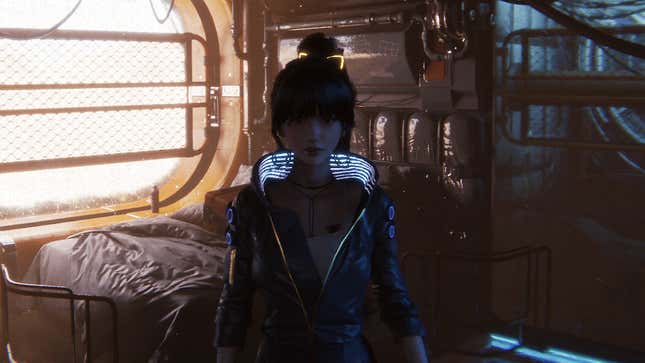
Unity and Convai have released a trailer for their AI demo, Project Neural Nexus, and it predictably looks and sounds like shit. Project Neural Nexus is meant to be a proof-of-concept AI demo that’s also powered by Unity— you know, the company behind the similarly titled game engine that tried to force an installation fee that threatened to “kill smaller games” and their developers before walking it back last year.
Project Neural Nexus is a sci-fi game demo set in Neo City (I get this isn’t a full game, but c’mon) where players wake up in a hotel after being chased by the police and “killer robots.” Soon after, the hotel is seemingly beset by assassins and it’s on you and your companion to fight your way out. The trailer shows a fairly generic cyberpunk setting, featuring staples such as Times Square-style billboards and neon signage everywhere. Even the character models look like they were ripped straight out of Cyberpunk 2077. They’re certainly checking boxes, but probably not the ones they ought to.
Convai bills the player’s AI companions as “smart NPCs,” which is funny given how dumb they feel. It’s not that they don’t know words, it’s that they don’t know how to say them. The video they released is abound with some of the flattest readings I’ve ever heard. The player character at one point blandly demands to know “what the gangs are up to.” The next scene has them ask my favorite line: “Hey, what is that tree over there?” A robot, which ironically has the most spirited delivery in the whole trailer, flatly responds, “The tree is the hologram of Yggdrasil, the Norse realm tree.”
If the point of the demo was to prove you can program a robot to say just about anything in the most boring manner possible, congratulations to all involved. If this is supposed to be some pitch for AI capable of advanced and confident worldbuilding, I’m sorry to report that this sucks all kinds of ass. It’s like no one in Neo City has ever heard of tone or pitch. For something billed as this exciting and cutting-edge cyberpunk experience, the player’s companion, Seraph, couldn’t sound less thrilled about having “retrieved the SMG for you.”
Coming off of just playing Cyberpunk 2077 for the first time a few months ago, the differences could not be more drastic. As riddled with issues as it is, you couldn’t really accuse Cyberpunk 2077 of lacking a personality or sense of style. The specificity of the writing in that game, thanks to slang terms like “choom” or “nova,” stood out as clear as day. The delivery of the lines from real humans, in particular the performances of the female player character (Cherami Leigh) and Johnny Silverhand (Keanu Reeves), helped impress those lines on players. The only memorable thing about Project Neural Nexus, and truly most AI demos, is how short it falls of the real deal.
Despite these frequent shortcomings, the games industry is peddling AI more than ever. Last year, the first-person shooter The Finals made a huge splash and was quickly undone after it was revealed that the developer Embark Studio used AI for the in-game announcer. CEOs in charge of some of the most influential developers like Square Enix have only doubled down on the usage of AI in development, and companies are accused of using AI to scrape others’ art seemingly every other week. Meanwhile, the games industry keeps shedding valuable workers that these companies should value and compensate properly to keep making the quality games that AI will simply never reproduce.
Correction: 03/18/2024, 4:50 p.m. ET: A previous version of this article erroneously said NVIDIA played a role in creating the Sakura Rabbit demo. The demo was a collaboration between Unity and Convai. Kotaku regrets the error.